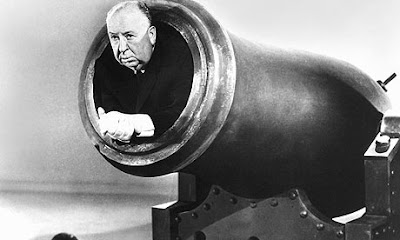Alfred Hitchcock, the macabre master of movie-making, is born in London on August 13, 1899. His innovative directing techniques and mastery of suspense made him one of the most popular and influential filmmakers of the 20th century.

His Blackmail (1929) was Britain's first widely successful talking feature, and Hitchcock used sound effectively and imaginatively. During the 1930s, he gained international fame with immensely popular thrillers such as The Man Who Knew Too Much (1934), The 39 Steps (1935), and The Lady Vanishes (1938). In 1939, he left England for Hollywood, lured by its superior technical facilities. His first American film was Rebecca (1940), a drama starring Laurence Olivier that won an Academy Award for Best Picture and further cemented Hitchcock's reputation.
Hitchcock remained in Hollywood and directed a string of memorable thrillers in the 1940s, including Suspicion (1941), Shadow of a Doubt (1943), and Notorious (1946). By the 1940s, he was serving as his own producer, thereby ensuring greater artistic control over his films. The psychologically complex and technically innovative films that followed are regarded as his most brilliant. These masterpieces of moviemaking, which starred some of the leading actors and actresses of Hollywood, include Strangers on a Train (1951), Dial M for Murder (1954), Rear Window (1954), To Catch a Thief (1954), Vertigo (1958), North by Northwest (1959), Psycho (1960), and The Birds (1963). In these meticulously orchestrated films, protagonists descend out of everyday life into tense and nightmarish situations where nothing is as it seems. To build and maintain suspense, Hitchcock employed unusual camera angles, elaborate editing techniques, dynamic soundtrack music, and touches of wry humor and the macabre.

With his courtly manner, pear-shaped figure, and farcical drawl, Hitchcock became a celebrity in his own right, and in the 1950s and 1960s he produced and hosted two mystery series on television, "Alfred Hitchcock Presents" and "The Alfred Hitchcock Hour." He also made cameos in most of his films, and movie fans stayed alert to catch his fleeting, often humorous appearances on the screen.
Although he never won an Oscar for his film direction, he received the prestigious Irving Thalberg Award from the Academy of Motion Picture Arts and Sciences in 1967. In 1980, he was knighted by Queen Elizabeth II of his native Britain, even though he had long been a naturalized U.S. citizen. Hitchcock died later that year, having directed nearly 60 films in his long career.
Taken from: http://www.history.com/this-day-in-history/hitchcock-born [13.08.2013]

No comments:
Post a Comment